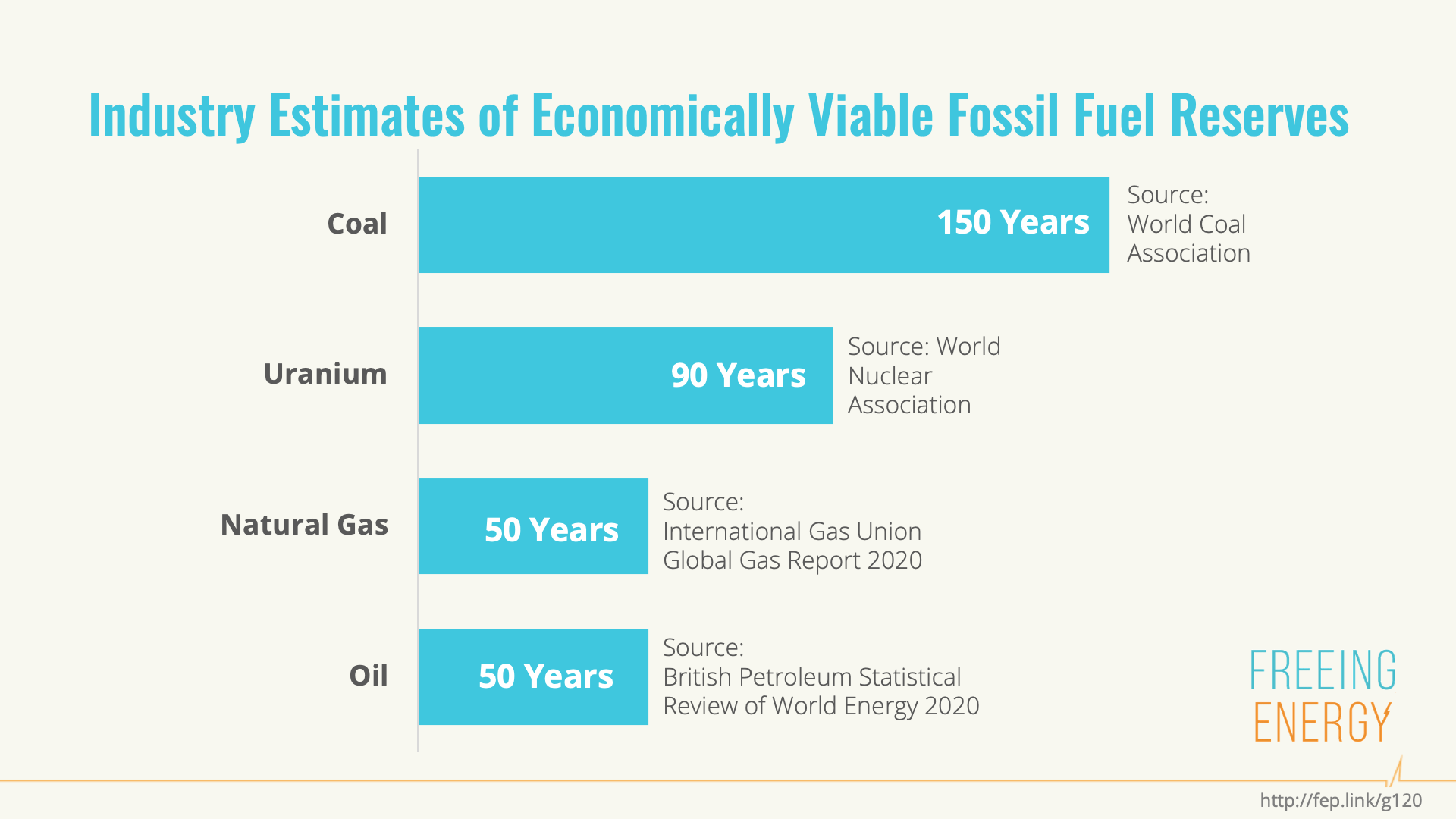The Stone Age didn’t end because we ran out of stones. Similarly, the world will probably never run out of oil, coal, and natural gas. But each time we extract a million tons of these finite resources, the next million becomes harder and more expensive to get. It’s like a barrel full of golf balls. At first, it’s easy to pull them out by the handful. But, the farther down in the barrel you have to reach, the more effort it takes to get each ball. At some point, it becomes too difficult and expensive to extract more. The only question is when does it become too hard?
What do experts think? To be super-conservative, we’ll use the forecasts from the industry trade groups that represent each kind of fuel (their answers may surprise you). British Petroleum Statistical Review of World Energy 2020 estimates 50 years of remaining oil reserves. The World Coal Association puts economically recoverable reserves at 150 years. And, the International Gas Union Global Gas Report 2020 says predicts 50 years of viable natural gas reserves. For a deeper dive, including the 90-year forecast for nuclear fuel, you can read, If we used this much fossil fuel in Edison’s time, we’d have already run out.
GET MONTHLY NEWS & ANALYSIS
Unsubscribe anytime. We will never sell your email or spam you.
Related articles
- Freeing Energy article: How solar and batteries will unlock the electric monopolies and create a clean energy renaissance
- Freeing Energy article: The inevitability of a solar-powered future
- Freeing Energy article: Five trends that will lead to the end of fossil fuels


4 Responses
Most don’t understand the simple concept of converting permanent magnetic force into a self contained unlimited energy source that could replace fossil fuels as the power source for the future.
Or most don’t want to understand this form of usable energy.
In any case batteries need charging and the daily solar energy will never replace fossil fuels.
But no one wants to hear or tell that story.
If the world was told how simple it is to develop magnetic force into usable power to replace fossil fuels
The fear of running out of fossil fuels may not be an issue.
interesting on how people think. Don’t you think so?
One point that rarely gets addressed is that all forms of on demand readily available energy needs ‘Fossil Fuels’ as the basis, how do you build a nuclear fission station without diesel trucks for example. EV’s rely themselves on Fossil Fuels to extract minerals at humungous rates. Some nations do not have enough resources to function & use dung for fuel, maybe this is what the first world will necessarily go back to, unless we curb the over usage of Coal, Oil & natural Gas?
KJ, I agree that all types of energy generation will rely on fossil fuels to some degree. But it’s the matter of degree that matters. Using gasoline powered trucks and high-CO2 cement to build a nuclear plant will result in some level of emissions but that level is far below burning coal or natural gas directly to make electricty. Fortunately, there are hundreds, if not thousands, of “lifecycle” studies that show the total CO2 emitted by every kind of electricity generation (nuclear, solar, wind, geothermal, etc) and every kind of transportation (gasoline cars, EVs). The results are what you’d expect: over the lifetime of a powerplant or vehicle, less CO2 is created when renewable generation is involved than a purely fossil fuel driven system.
Thanks Bill Nussey, I’d like to see some of those studies & even the lower level calculations to the nth degree. Some forget that all the FossilFuels used in mining, muster, design, build, support, spare, repair through to final decommissioning, including the workers usage themselves & their households etc. etc. etc. I don’t disagree with the thought experiments that you mention, however on day all Coal, Oil & Gas will be depleted, even making the so called but weather dependent ‘renewables’, which may extend our deluxe civilisation in the west, say for arguments sake to a max. off 200 to 300 years? Eventually without Fusion producing more energy out that in, (still requiring the basic energy nature has provided us with those natural COG’s) a million times recent breakthrough(s) or some new yet undiscovered abundant readily available base energy. My mind remains open to all points, but concerned with all the wastage especially now with war in Europe destroying what took many decades to construct.